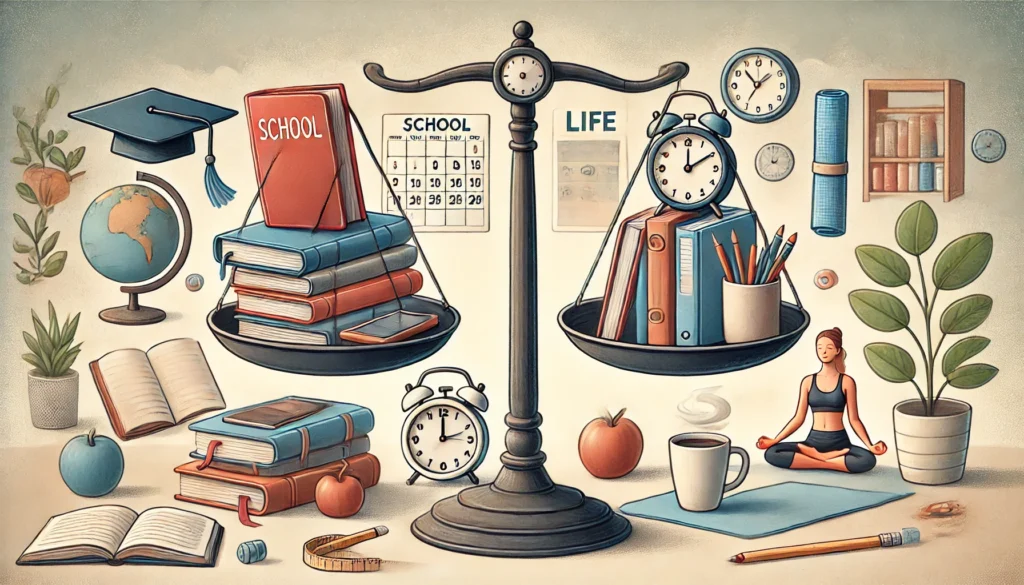
Balancing school and personal life is a challenge faced by students of all ages. Whether you’re juggling academics, extracurricular activities, part-time jobs, or social commitments, managing time effectively is crucial for success and well-being. This article outlines practical strategies to help students maintain a healthy balance between their academic responsibilities and personal life.
One of the key factors in balancing school and personal life is setting priorities. Start by identifying your academic and personal goals. What’s most important to you? Is it maintaining high grades, staying active in sports, spending time with family, or focusing on your hobbies? Knowing your priorities will help you allocate time to each area without feeling overwhelmed.
Once you’ve set your priorities, planning becomes essential. Use a planner, calendar, or time-management app to organize your schedule. Block out time for classes, study sessions, assignments, and exams, but also ensure that you schedule time for relaxation, hobbies, and social activities. This approach prevents you from overcommitting in one area while neglecting others.
Many students feel pressured to do everything at once, but overloading your schedule can lead to burnout. Instead, create a balanced schedule that includes both academic and personal time. Break down larger tasks into smaller, manageable pieces and assign deadlines that are realistic.
Make sure to set aside time for breaks. Studies show that taking short breaks during study sessions improves focus and retention. Use techniques like the Pomodoro method (25 minutes of study followed by a 5-minute break) to enhance productivity.
Effective study habits can help you balance schoolwork with your personal life. Instead of cramming the night before exams or rushing through assignments, practice consistent, focused study sessions throughout the week. Active learning techniques, such as summarizing information, using flashcards, or teaching concepts to someone else, can help reinforce your understanding and reduce the time spent reviewing material.
Staying organized is also key. Keep track of deadlines and important dates for assignments and exams, and make it a habit to review your notes regularly. This reduces the likelihood of last-minute stress and gives you more free time to enjoy your personal life.
Saying “no” is difficult, especially when you want to be involved in multiple activities. However, overextending yourself can result in stress and exhaustion. Learning to set boundaries is crucial for maintaining a balance between school and personal commitments.
If you feel overwhelmed, it’s okay to decline additional responsibilities or social engagements. You can’t always be everywhere or do everything, and prioritizing your well-being will help you avoid burnout.
Physical and mental health are the foundation of balance. Eating nutritious food, getting regular exercise, and ensuring enough sleep are essential for maintaining energy and focus. When you’re physically healthy, you’re more likely to perform well academically and have the energy to engage in personal activities.
Sleep, in particular, plays a critical role in learning and memory. Prioritize getting 7-9 hours of sleep per night, and avoid late-night study sessions, as they can impair your cognitive functions the following day.
If you find it challenging to balance school with other aspects of your life, don’t hesitate to seek support. Reach out to teachers, academic counselors, or peers for advice on managing your workload. Many schools also offer resources such as tutoring, study groups, or counseling services.
Discuss your situation with friends and family as well. Let them know if you’re feeling stressed, and they can provide encouragement or help you adjust your schedule.
Personal time is essential for recharging your energy. Engage in activities that bring you joy, whether that’s spending time with friends, pursuing a hobby, or simply relaxing. Mental breaks from academic responsibilities help you maintain a positive outlook and reduce stress levels.
Remember, balance is about moderation. Striving for excellence in your studies is important, but so is enjoying your personal life and taking care of your well-being.
Balancing school and personal life is a continuous process that requires self-awareness and flexibility. By setting priorities, organizing your schedule, maintaining healthy habits, and seeking support when necessary, you can achieve academic success while still enjoying your personal time. A well-balanced life leads to better productivity, improved mental health, and a more fulfilling school experience.